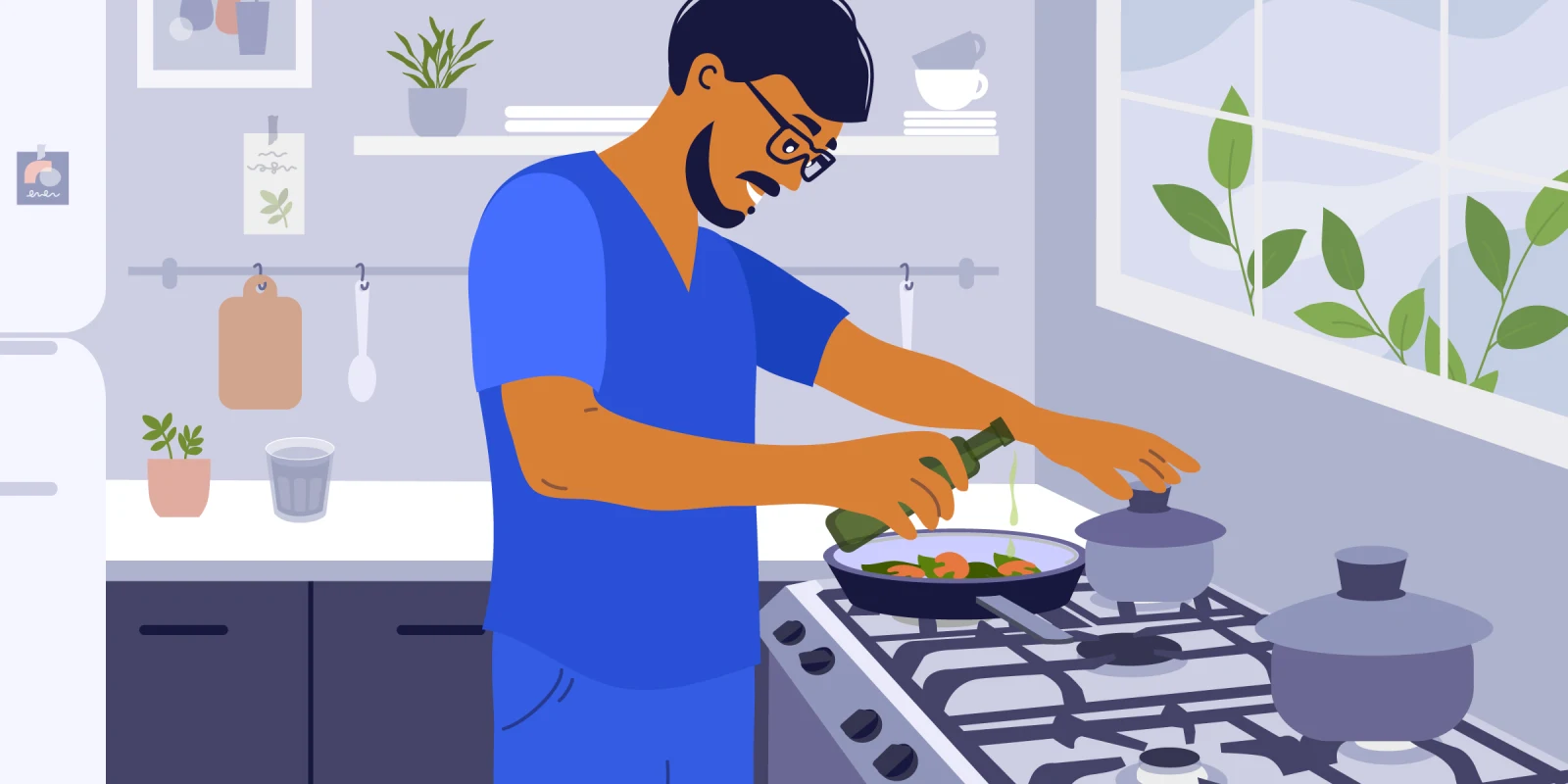As doctors, we strive for work-life balance. This is the equilibrium between hospital life and seemingly everything else. Achieving work-life balance in medical school was challenging but I was able to rely on the study habits I perfected as an undergraduate student. Conversely, achieving this stability as an internal medicine resident was a more formidable task. Beyond the responsibilities of adulthood, residency involves a full-time job in conjunction with research and independent study. Eighty-hour work weeks initially weakened my personal health by creating stress and causing sleep deprivation.
As a result, it was difficult to consistently prepare healthy meals for the week. I love ordering take out, but quickly realized that doing so on a regular basis was expensive and affected my work performance. Eating fast food regularly decreases learning retention, the process of transferring new information into long term memory. By exploring the joys of cooking, I discovered a creative outlet to help rest my mind from the challenges of residency. Antagonists to home meal prep say that it is cumbersome and boring. However, since starting residency two years ago, I have instituted ten culinary commandments to make meal prep manageable, easy, and even enjoyable!
1) Cook in Bulk
Cooking can be messy as pots and pans pile into an ominous tower. I learned to prepare multiple portions at once to get the most out of each meal prep. Large baking sheets allow me to prepare pounds of different proteins and vegetables.
2) Buy Local When Possible
Hand selecting ingredients from locally sourced vendors has helped me take ownership over my meals. Exploring the Farmer’s Markets in Columbia, Missouri have also taught me more about the community and its populace after moving here from New York City. Nevertheless, I sometimes settle for the regional supermarket when I’m in the ICU or on the medical wards.
3) Get Lost in the Sauce
I love marinating meats and vegetables in different sauces and spices. This keeps my meals fresh and exciting. Contrasting sweet and savory flavors prevents getting accustomed to the same foods.
4) Cook With Loved Ones
Long work weeks and traveling far from home have made it challenging to connect with family. When I’m not cooking with my girlfriend, I’m sharing culinary adventures with my friends and family on video chat. Cooking with the people I care about has allowed me to enjoy quality time with them while simultaneously preparing meals for the week.
5) Schedule Cheat Day(s)
Meal prepping for long work weeks was initially overwhelming. However, I learned to schedule cheat days to alleviate this stress. As a senior resident I often order pizza for our medicine team on call days. This also builds camaraderie within the team. While working at the Veterans Hospital I like walking to our local food truck for a turkey sandwich or grilled cheese. Scheduling cheat days provides a nice reward for my meal prep efforts.
6) Containers Count
Investing in functional travel containers keeps my food fresh and organized. I found that airtight containers are best for fruits and vegetables. Glass containers are good for fish, which can leave a lingering odor in plastic containers. Additionally, I try to purchase microwave safe containers to enjoy a hot, home cooked meal during our daily educational noon conference.
7) Buy Dishwasher Safe
Typically, I work six days a week. Buying dishwasher safe kitchen ware has allowed me to use my day off more efficiently by avoiding washing dishes by hand. Furthermore, dishwashers use less water than washing dishes in the sink, making the water bill more compatible with my resident salary.
8) The Freezer is Your Friend
Storing food in the freezer gives me instant access to home cooking at a moment's notice. I love preparing chicken soup, lasagna, ziti, stock, and stuffed cabbage, which all freeze well. Frozen meals come in handy on busy ICU rotations when I lack the time and energy to grocery shop. Secondly, frozen store-bought fruits and vegetables appear to have equal nutritional value compared to non-frozen produce.
9) Shopping Lists Save Time and Energy
Before heading to the supermarket, I prepare a list ahead of time. This makes shopping more efficient. I draft my shopping list the night before work so I can make a grocery run on the way home from the hospital.
10) Ask for Help if Needed
As an internal medicine resident, I frequently ask my attendings and co-residents for help. Similarly, I rely on friends and family who have unique recipes and culinary techniques. Recreating my mom’s brisket recipe or my grandma’s famous matzah ball soup helps me feel more at home. Additionally, connecting through food helps me maintain relationships with my loved ones.
Although weekly meal prep can be overwhelming and stressful, it is important to be patient with yourself and develop a routine. Hopefully my experience with these ten culinary commandments will make your meal prep easy and enjoyable. Bon Appétit!
How do you make time for meal prep as a busy clinician? Share your strategies in the comments below!
Maxwell Isaac is an internal medicine resident at University Hospital in Columbia, Missouri. Originally from New York, Maxwell is pursuing a career in cardiology.
Image by Olga Strelnikova / GettyImages






